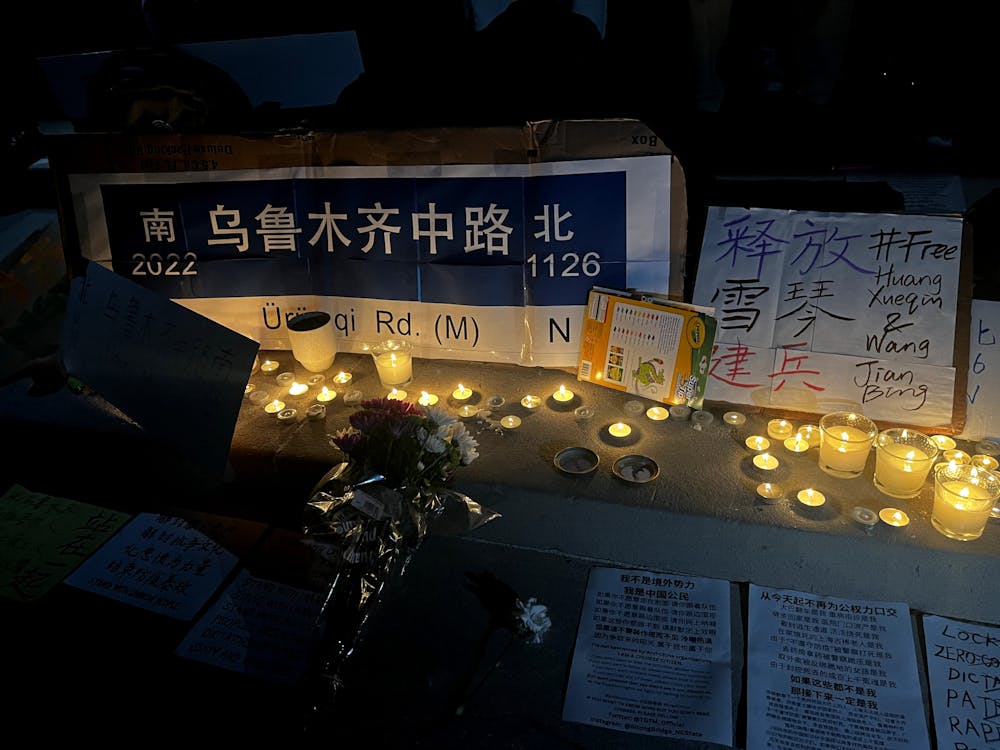Over a hundred community members of the Duke and Triangle area gathered on the steps of the Chapel on Monday night for a candlelight vigil honoring the victims of a recent apartment fire in the Chinese city of Urumqi, the capital of the Xinjiang region.
Ten people died in the fire Thursday and nine were hospitalized for smoke inhalation. Across social media and in widespread protests that have occurred in the wake of the fire, many have attributed the tragedy to overly strict COVID-19 protocols that prevented people from being able to leave their homes.
Attendees of Monday’s vigil ranged from Chinese-American Duke students, international students from China and other members of the Triangle’s Chinese communities. At least 20% of the attendees were from Chapel Hill, according to a protest organizer who requested to remain anonymous due to fear of retaliation from Chinese authorities.
The organizer said that Duke was the second university in the U.S., after Columbia University, to hold such a protest of China’s lockdown policy.
On the Chapel steps, protesters lit candles, laid bouquets of flowers and placed signs with messages such as “Urumqi Rd.,” “Liberty or Death” and “No lockdown, no Zero-COVID policy, no dictatorship.” Several held up blank sheets of paper, a symbol of peaceful protest which has been used to evade state censorship in China.
The Xinjiang region has been under strict lockdown since early August. Flyers distributed at the vigil described the effects of these lockdowns.
“Residents’ doors are welded and wired shut from the outside for hundreds of days on end; food is scarce and costs twenty times its usual price; people lose their jobs and businesses go bankrupt,” the flyer read.
Protesters took turns cautiously but defiantly sharing their stories with the crowd. Some spoke in English, while others spoke in Mandarin.
“I can’t mourn in silence,” one speaker said. “I feel anger burning in my heart because I think no one, no soul, no light, deserves being locked in their own home, and suffering in a fire because of pandemic restrictions.”
The speaker said that though thousands share this anger, people are afraid to share their outrage over channels such as WeChat.
As the night went on, the messages shared by mourners were sometimes interspersed with spontaneous chants, laughter over the details of the lockdown policy and yells of frustration.
Several called for unity, expressing solidarity with protesters in China. One asked the crowd to put themselves in the shoes of those living under Xi Jinping’s regime, even if they held different beliefs or identities.
“I am always the next [target]. You are the next one. You are the next one. Everyone here is the next one,” the speaker said, pointing at members of the crowd. “If we don't unite, we will just forget.”
A second flier distributed at the event compared the Urumqi fire to other widely-publicized tragedies which have occurred in the wake of Xi’s ongoing zero-COVID policy. The flyer pointed to the widely-publicized death of a 55-year-old woman in Inner Mongolia who fell from the top floor of her apartment building as her daughter begged local officials to unlock the gate to the complex.
One speaker shared a personal story, telling attendees that his sister, who lives in mainland China with the rest of his family, has recently been identified as having close contact with a person who tested positive for COVID-19 in her school.
“It's a very high possibility that someone will come today or tomorrow to take her to one of those quarantine buildings, and maybe my family as well,” he said. “I called my parents yesterday, and they told me they won't open the door. They won't go to the quarantine building. And if necessary, the police will have to bust through the door of my house.”
Get The Chronicle straight to your inbox
Sign up for our weekly newsletter. Cancel at any time.
Anisha Reddy is a Trinity junior and a senior editor of The Chronicle's 118th volume.

